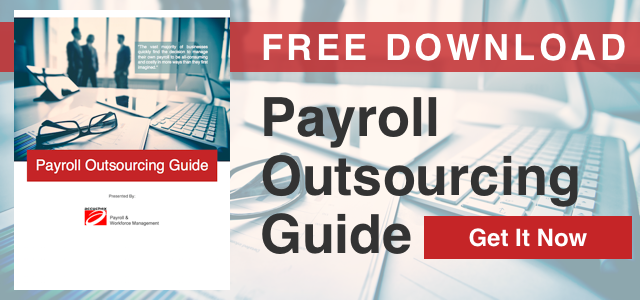 On February 17, 2016, the Department of Labor (DOL) Solicitor of Labor announced that the DOL’s Final Rule regarding the Fair Labor Standards Act (FLSA) White Collar Exemption Regulations will be published in July 2016.
On February 17, 2016, the Department of Labor (DOL) Solicitor of Labor announced that the DOL’s Final Rule regarding the Fair Labor Standards Act (FLSA) White Collar Exemption Regulations will be published in July 2016.
This rule will impact HR and payroll management for almost every employer in the state.
According to the Solicitor, the Secretary of Labor would prefer to release the final rules even earlier, perhaps by “late spring.” When the Final Rule is published, however, it will have an effective date only 60 days later.
An Overview of the Impact for HR and Payroll Professionals
The new rule being proposed would update the regulations governing which “white collar” worker’s - that is, executive, administrative and professional employees - are entitled to minimum wage and overtime pay protections.
The final rule is expected to increase the minimum salary level for these "white collar" exempt employees, and will provide for an automatic annual increase of that minimum level. Another result of the proposed change will be that fewer employees will meet the requirements to be exempt from overtime. This will mean that they will either be entitled to receive overtime pay, or will have to receive a higher salary in order to remain exempt under the FLSA guidelines.
Specific proposals include:
- Setting the standard salary level at the 40thpercentile of weekly earnings for full-time salaried workers or $921 per week, or $47,892 annually. This is more than double the current salary threshold for exemption, which is $455 per week, or $23,660 per year.
- Increasing the total annual compensation requirement needed to exempt “highly compensated employees” (HCEs) to the annualized value of the 90th percentile of weekly earnings of full-time salaries workers or $122,148 annually.
- Establishing a process to automatically update the salary and compensation levels going forward to ensure that they will continue to provide a useful and effective test for exemption.
Challenges to the Proposed Rule Change
According to the DOL , the intentions of these amendments are to “minimize the risk that employees legally entitled to overtime will be subject to misclassification based solely on the salaries they receive, without excluding from exemption an unacceptably high number of employees who meet the duties test;” and ensure that the standard salary and HCE total annual compensation requirements remain meaningful tests for distinguishing between bona fide executive, administrative, and professional workers who are not entitled to overtime and overtime-protected white collar workers.
However, over 100 members of the US House of Representatives signed a letter to the Secretary of Labor on February 9, 2016, expressing concerns with the proposed Rule’s ambiguity as to any proposed changes to the duties requirements. The letter requested that the DOL “reconsider moving forward with this rule as drafted.”
It is quite possible that Congress may consider using a Congressional Review Act challenge to the Final Rule, if it is dissatisfied with the specifics of the rule.
What You Should Do to Prepare
A new Final Rule will be announced and there will be very little time between its announcement and DOL enforcement. Employers and HR managers should begin preparing now, since the result will be a substantial increase in non-exempt workers, and possible wage and hour litigation, as well as compliance related issues.
As pointed out by HRUSA:
"Once the Final Rule is announced, employers will need to respond quickly – potentially creating budgetary and operational concerns. Possible employer responses will likely include:
- Significant increases in salary to maintain exempt status;
- Reclassifying employees to nonexempt status;
- Modifying job duties and position descriptions to comply with any changes to the “duties” tests;
- Changing work-hour and scheduling requirements to eliminate overtime;
- Adjusting to timekeeping requirements for historically exempt employees;
- Restructuring bonus and incentive pay; and
- Managing employee responses concerning such changes."
Though the exact contents of the Final Rule are not known, employers need to be aware that these changes to the law are coming and will most likely be in effect before the end of 2016. Employers should consult with experienced labor counsel now to determine which policies and procedures are likely to be affected by the new rule. Employers should also advise their accounting staff to review possible changes to compensation structures, and decide what the best strategy will be, such as increasing salaries or reclassifying employees.
Aggressive enforcement is expected from the DOL and employers will only have 60 days after the announcement of the rule to analyze and, if need be, modify any policies, procedures, job descriptions and duties, and compensation structures before the rule goes into effect.
Where to Find Help With Compliance
HR and payroll compliance is a labor-intensive requirement of all employers, but it can be achieved and there are scores of resources available for the employer who chooses to manage their own payroll processes. Here are a few to get you started:
- http://www.dol.gov/compliance/#.UKNG_-Oe-_A
- http://www.irs.gov/uac/Publication-15-(Circular-E),-Employer's-Tax-Guide
- http://www.sba.gov/content/learn-about-your-state-and-local-tax-obligations
Another option to consider is utilizing a managed payroll service. By outsourcing these functions you can also outsource all of the requirements that are currently on your HR staff to maintain compliance. If you have questions regarding this, or other HR issues and practices, let us help you in managing your HR needs, payroll processes, and staying on top of compliance demands. Get your Free Download: Payroll Outsourcing Guide to help you make an informed decision or call Accuchex Payroll Management Services at 877-422-2824.


